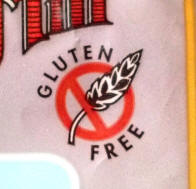SURVEY SHOWS THOSE AVOIDING GLUTEN DON'T KNOW
WHAT IT IS.
By Ben Radstein, Staff Reporter
 "Gluten
Free" is the current craze among shoppers seeking healthier food, but what does
that mean? Do people really know? This was the subject of a survey recently done
by The Helvetica Institute. Surveyors asked hundreds of people in grocery stores
and on the street two questions: "Are you avoiding gluten in your diet?", and
"What is gluten?" About half of those who responded confirmed that they are
avoiding gluten, but nearly none could correctly say what it is.
"Gluten
Free" is the current craze among shoppers seeking healthier food, but what does
that mean? Do people really know? This was the subject of a survey recently done
by The Helvetica Institute. Surveyors asked hundreds of people in grocery stores
and on the street two questions: "Are you avoiding gluten in your diet?", and
"What is gluten?" About half of those who responded confirmed that they are
avoiding gluten, but nearly none could correctly say what it is.
"Gluten? Yeah, that's a sugar. Diabetics
should avoid it for sure" said Paul Smith. No, he was thinking of glucose.
Glucose, not gluten, is the simplest sugar; the one diabetics need to track the
levels of in their blood. "Gluten is a pesticide they spray on vegetables" said
Stephanie Williams. "Really nasty stuff! I'm not feeding that to my kids." Hank
Kuhn answered, "Yes, gluten is an antibiotic they feed to livestock, no wait! It
was that growth hormone they give to cows to make more milk." He paused to
think, then said, "Well, it is
definitely one of those." "Gluten? I don't know what it is, but all my
girlfriends tell me it's bad so I ain't having none of that." said a women who
declined to give the surveyor her name. Answers like hers were by far the most
common.
For the record, gluten is a protein that
forms in rising dough made of grains such as wheat, barley, spelt and rye. For
most people, it is a perfectly healthy source of protein. However, to those
suffering from a rare condition called celiac disease, gluten is poison. Even a
tiny amount can make them sick. Why is such a rare condition causing such a
furor? Because of another condition hypochondriacs and holistic snake oil
charlatans tout; gluten intolerance, also sometimes called non-celiac gluten
sensitivity. This alleged condition has been extensively studied, and no
evidence that it actually exists has been found. Some people do seem to have a
sensitivity to grains, but gluten is not the culprit.
Has this diet fad done any harm? Yes, says
lead researcher Dr. Simon Hurtz. Because "Gluten Free" is a buzzword, it is
being slapped onto the labels of hundreds of products, many of which aren't
really gluten free. They contain trace amounts that are enough to make a celiac
sufferer sick. Some people with celiac have resorted to specially trained gluten
sniffing dogs. That is the only way they can be sure. Dr. Hurtz pointed out that
he has seen places like pizza restaurants advertising gluten free crusts. "That
is silly," he stated. "As someone who has celiac can not even safely enter a
pizza joint, or any place that
uses flour. The instant those gluten free crusts are removed from plastic
wrapping, they are cross-contaminated. It is even possible for
flour particles wafting through the air to irritate celiac sufferers."
One study alone isn't enough evidence to
draw a conclusion, so Helvetica Institute submitted their findings to other
institutions for peer review. Dr. Richard Payne of Brandine University said. "I
concur with Professor Hurtz's findings. Dr. Martin Pratt and I also studied the
gluten free fad. Our surveys also show that the people who are afraid of gluten
are avoiding it based solely on hearsay, and have no idea what it is."
There you have it. Other than for people
who have celiac disease, gluten free is just another silly diet fad. I am going
to continue to enjoy my breads and pastas with no worries. You should, too.
 "Gluten
Free" is the current craze among shoppers seeking healthier food, but what does
that mean? Do people really know? This was the subject of a survey recently done
by The Helvetica Institute. Surveyors asked hundreds of people in grocery stores
and on the street two questions: "Are you avoiding gluten in your diet?", and
"What is gluten?" About half of those who responded confirmed that they are
avoiding gluten, but nearly none could correctly say what it is.
"Gluten
Free" is the current craze among shoppers seeking healthier food, but what does
that mean? Do people really know? This was the subject of a survey recently done
by The Helvetica Institute. Surveyors asked hundreds of people in grocery stores
and on the street two questions: "Are you avoiding gluten in your diet?", and
"What is gluten?" About half of those who responded confirmed that they are
avoiding gluten, but nearly none could correctly say what it is.